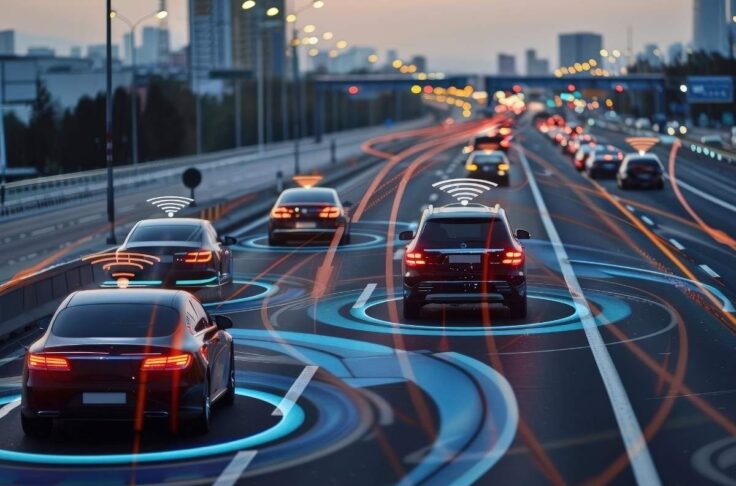
INVERS Mobility Barometer: More than 400 providers of station-based car sharing in Europe

The new edition of the Invers Mobility Barometer analyses the overall market for station-based car sharing in Europe for the first time. This form of car sharing refers to the business model with which car sharing began more than 30 years ago: Customers pick up a sharing vehicle at a car sharing station and must return it there afterwards. In recent years, many offers have been established and variants developed. The key findings:
- More than 400 operators across Europe with over 55,000 cars in more than 20 countries
- The largest fleets operate in Germany, France, the Netherlands, the UK and Switzerland
- A significant proportion is electric, and the trend is rising
- The variety of vehicle classes is increasing
Siegen, November 14th, 2023 – For the third issue of the Invers Mobility Barometer, the technology provider’s research team analysed the European market for station-based car sharing. The experts have compiled current, often country-specific research results, published information and findings from interviews with market experts and combined them with their own research. “This edition of the Barometer complements the series of detailed analyses of the car sharing market that we presented with the Mobility Barometer on European free-floating car sharing in May 2023 and on the European car subscription market in August 2022,” says Bharath Devanathan, Chief Business Officer at Invers. “For the first time, it provides an overview of the entire European market for station-based car sharing, reveals national differences and identifies industry trends.”
The industry refers to station-based car sharing as a business model in which customers can reserve, pick up and return a car, usually at the same location or car park. In contrast, free-floating car sharing allows customers to rent cars flexibly within a defined service area and return them elsewhere – they can find the nearest car spontaneously via an app. With station-based car sharing, unlike conventional car hire, users register as members of the car sharing service. They then receive keyless access to the car via apps, keycards or key safes, so that the cars are available flexibly and around the clock. Alternatively, station-based car sharing is often referred to as round-trip car sharing.
-
More than 400 operators across Europe with over 55,000 cars in more than 20 countries
Across Europe as a whole, the analysis comes to a fleet size of around 55,000 cars in station-based car sharing. This shows that there are a particularly large number of providers in northern, western and southern European countries. Around 240 of the more than 400 providers are active in Germany alone.
Most markets also offer free-floating in addition to station-based car sharing. The exceptions are for example Switzerland, Ireland and Norway, which focus on station-based and peer-to-peer car sharing. For Switzerland, Jonas Schmid, Director of the Swiss Alliance for Collaborative Mobility (CHACOMO), explains: “The station-based model seems to fit best with the understanding of carsharing in Switzerland. Car sharing is promoted where public transport and cycling are not an option.” It is also interesting to note that the boundaries between the business models are becoming blurred. For example, Share Now, known for its free-floating model, offers station-based car sharing in Münster. The peer-to-peer provider Getaround also offers many vehicles that are provided from private fleet owners but are offered on a permanent basis, similar to the station-based car sharing model.
-
The largest fleets operate in Germany, France, the Netherlands, the UK and Switzerland
Most of the 55,000 cars in European station-based car sharing are on German and French roads. The German Carsharing Association states that there are 15,300 vehicles in Germany, while the French association AAA counts 11,400 vehicles. This is followed by the Netherlands, the UK and Switzerland. Other larger markets include Austria, Belgium, Norway, Spain and Sweden.
-
A significant proportion is electric, and the trend is rising
National car sharing data shows that in the most important markets, station-based car sharing fleets or mixed fleets that combine station-based and free-floating have a significantly higher proportion of electric cars than private vehicles. The leader here is Italy, where a good 60 per cent of the station-based car sharing fleet is electric, followed by the Netherlands with 30 per cent and Germany with 20 per cent. And the trend is rising. For the UK, for example, Antonia Roberts, Deputy Chief Executive of the British car sharing association CoMoUK, notes: “The share of electric cars within the UK’s car club fleet grew from 12% in 2021 to 14% in 2022. This compares favourably to only 2% of private cars in the UK being electric.” In many markets, car sharing is playing a key role in the uptake of electric vehicles at a national level. Customers are gaining initial experience with electric vehicles on carsharing platforms. Manufacturers of electric cars often enter new markets via car sharing platforms.
-
The variety of vehicle classes is increasing
The vehicles offered in the sharing model increasingly include other vehicle classes in addition to the traditional vehicle classes such as small and medium-sized cars. These include vans and microcars, for example.
The INVERS Mobility Barometer Vol 3 “European Station-Based Carsharing” can be found here.
About Invers
Invers, inventor of automated vehicle sharing, enables mobility service providers to launch, operate and scale their offerings with integrated hardware and software solutions specifically designed for developers of shared mobility services. As the world’s first shared mobility technology company, Invers is developing and reliably maintaining the fundamental building blocks at scale to offer its customers cost-efficient and easily implementable tech solutions.
The company acts as an independent and reliable partner for operators of services such as car sharing, car subscription, moped sharing, ride pooling and car rental services with the vision to make the use of shared vehicles more convenient and affordable than ownership. Customers include Share Now, Cambio, GreenMobility, Miles, Zity, Getaround and Flinkster. The company was founded in 1993 and has locations in Siegen, Cologne and Vancouver. The development takes place entirely in Germany.


